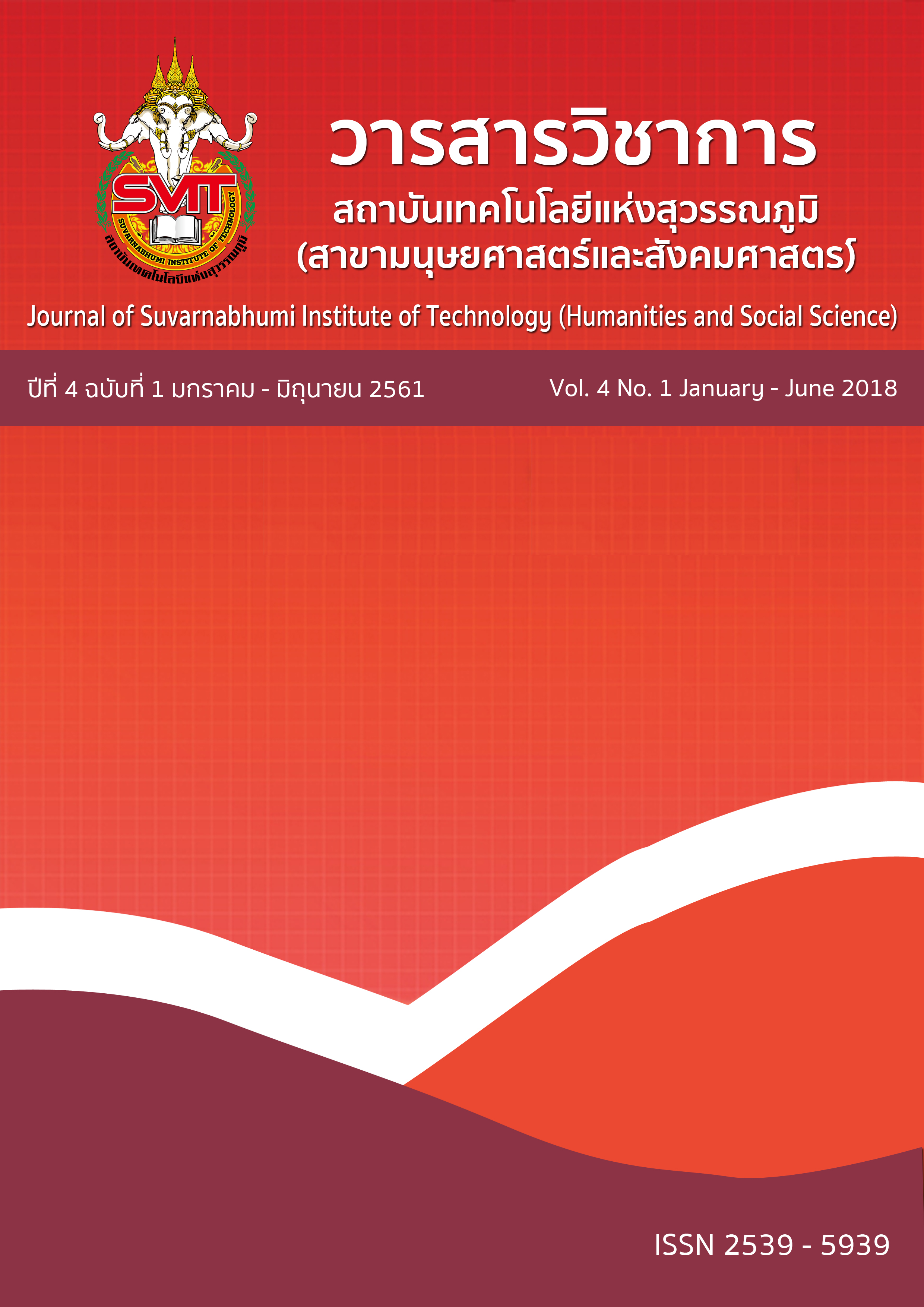THE DEVELOPMENT OF AN ENRICHMENT CURRICULUM FOR STUDENTS’ ETHICAL IMPROVEMENT IN PATHUMTHANI UNIVERSITY
Keywords:
Enrichment Curriculum, EthicAbstract
The objectives of this study were to: 1) develop an enrichment curriculum for students’ ethical improvement in private university; 2) examine the efficiency of the enrichment curriculum for students’ ethical improvement in private university; 3) study the feasibility of the enrichment curriculum for students’ ethical improvement in private university. The development of the enrichment curriculum consisted 4 steps, i.e. studying fundamental data, developing the enrichment curriculum, examining the efficiency of the enrichment curriculum, and studying the feasibility of the enrichment curriculum.
The development of the enrichment curriculum for students’ ethical improvement in Pathumthani University was conducted by studying fundamental data from documents, related research, as well as conducting in-depth interview. In doing so the students’ ethical factors which should be developed were identified. In developing the enrichment curriculum, its structure was developed in accordance with the fundamental data. As a result, the enrichment curriculum consisted of principle and rationale for developing enrichment curriculum, concepts, theories, objectives, and structure of the enrichment curriculum. The enrichment curriculum had 4 learning units with 25 study-hours. Each learning unit consisted of learning unit description, learning objectives, content, learning management, media and learning sources, measurement and evaluation. Then the enrichment curriculum structure was evaluated by an experts focus group.
In examining the efficiency of the enrichment curriculum, the improved enrichment curriculum structure was brought to experiment with one sample group of undergraduate students at Pathumthani University. The experiment of the enrichment curriculum was One Group Pre-Posttest Design. The curriculum was improved thereafter to being completed.In studying the feasibility of the enrichment curriculum for students’ ethical improvement in Pathumthani University, experts were asked to providing opinions on its feasibility. The research results revealed as follows.
1. The results of the enrichment curriculum development. The development of the enrichment curriculum for students’ ethical improvement in Pathumthani university consisted of principle and rationale, concepts and theories concerning enrichment curriculum development, objectives, and structure of the enrichment curriculum, learning activities, learning media, measurement and evaluation.
2. The examination results on the efficiency of the enrichment curriculum. The enrichment curriculum was brought to experiment with one sample group of undergraduate students at Pathumthani University. The results were as follows.
2.1 The comparison of students’ ethical scores revealed that the posttest mean score was statistically higher than that of the pretest at .01 level.
2.2 The results of ethical evaluation in individual units during the enrichment curriculum experiment revealed that the students passed the criteria 100%. The behavioral measurement of the students revealed that they passed the criteria 100% in 4 aspects of ethical behaviors.
3. The examination results on the feasibility of the enrichment curriculum. It revealed that the feasibility of the enrichment curriculum as a whole was at the high level. When considered individual aspects found every aspect was at the high level. They were arranged in descending order of mean as follows: document of the enrichment curriculum, content of the enrichment curriculum, knowledge gained from the enrichment curriculum, duration of the enrichment curriculum, appropriateness of activities of the enrichment curriculum, media of the enrichment curriculum, and appropriateness of evaluation of the enrichment curriculum.
References
กรมวิชาการ. (2546). การรายงานการติดตามและประเมินผลการจัดทำหลักสูตรสถานศึกษาขั้นพื้นฐานของโรงเรียนเครือข่าย. กรุงเทพฯ: โรงพิมพ์คุรุสภาลาดพร้าว.
เกรียงศักดิ์ เจริญวงศ์ศักดิ์. (2546). ภาพอนาคตและคุณลักษณะของคนไทยที่พึงประสงค์. กรุงเทพฯ: สำนักงานคณะกรรมการการศึกษาแห่งชาติ.
จันทิมา แสงเลิศอุทัย. (2550). การพัฒนาหลักสูตรเสริมเพื่อเสริมสร้างสมรรถภาพทางด้านเทคโนโลยีสารสนเทศและการสื่อสาร (ICT) สาหรับนักศึกษาวิชาชีพครู. (ปริญญาการศึกษาดุษฎีบัณฑิต สาขาการวิจัยและพัฒนาหลักสูตร, มหาวิทยาลัยศรีนครินทรวิโรฒ).
เฉลิมพล สวัสดิพงษ์. (2551). การพัฒนาหลักสูตรกลุ่มสาระการเรียนรู้ภาษาต่างประเทศเพื่อเสริมสร้างการเห็นคุณค่าในตนเองของนักเรียน ระดับชั้นมัธยมศึกษาปีที่ 2. (ปริญญาการศึกษาดุษฎีบัณฑิต สาขาการวิจัยและพัฒนาหลักสูตร, มหาวิทยาลัยศรีนครินทรวิโรฒ).
ชัยวัฒน์ สุทธิรัตน์. (2552). 80 นวัตกรรมการจัดการเรียนรู้ที่เน้นผู้เรียนเป็นสำคัญ. กรุงเทพฯ: แดเน็กซ์ อินเตอร์คอร์ปอเรชั่น.
ปรียานุช สถาวรมณี. (2548). การพัฒนากิจกรรมในหลักสูตรเสริมเพื่อพัฒนาทักษะการคิดเชิงวิเคราะห์ของนักเรียน. (วิทยานิพนธ์ปริญญาดุษฎีบัณฑิต สาขาการบริหารการศึกษา, มหาวิทยาศรีนครินทรวิโรฒ).
พระพรหมคุณาภรณ์ (ป.อ.ปยุตโต). (2551). พจนานุกรมพุทธศาสน์ ฉบับประมวลศัพท์. พิมพ์ครั้งที่ 12. กรุงเทพฯ: มหาจุฬาลงกรณ์ราชวิทยาลัย.
พรศิริ กองนวล และคณะ. (2550). การพัฒนารูปแบบการจัดประสบการณ์เพื่อส่งเสริมคุณธรรมจริยธรรมสาหรับเด็กปฐมวัยโดยใช้กระบวนการวิจัยแบบมีส่วนร่วม. รายงานการวิจัยโครงการวิจัยและเฉลิมพระเกียรติ เนื่องในโอกาสมหามงคลพระชนมพรรษา 80 พรรษา วันที่ 5 ธันวาคม 2550. กรุงเทพฯ:มหาวิทยาลัยราชภัฏธนบุรี.
พอเจตน์ ธรรมศิริขวัญ. (2552). การพัฒนาหลักสูตรบูรณาการกลุ่มสาระการเรียนการงานอาชีพและเทคโนโลยีเพื่อเสริมสร้างพฤติกรรมเชิงจริยธรรมของนักเรียนชั้นประถมศึกษาปีที่ 2. (วิทยานิพนธ์ดุษฎีบัณฑิต สาขาวิชาหลักสูตรและการสอน, มหาวิทยาลัยบูรพา).
มนตรี ยางธิสาร. (2554). การพัฒนาหลักสูตรฝึกอบรมวิธีสอนศีลธรรมระดับมัธยมศึกษาตอนต้นของพระสอนศีลธรรมตามโครงการของกระทรวงศึกษาธิการ. (ปริญญาดุษฎีบัณฑิต สาขาการศึกษาผู้ใหญ่, มหาวิทยาลัยศรีนครินทรวิโรฒ).
รัชนีกร ไพศาล. (2547). การพัฒนาหลักสูตรเสริมทักษะศิลปะด้านการวาดภาพสาหรับนักเรียนชั้นประถมศึกษาปีที่ 5 ของโรงเรียนแกนนาการปฏิรูปกระบวนการเรียนรู้ จังหวัดกาญจนบุรี. (วิทยานิพนธ์ปริญญาการศึกษามหาบัณฑิต สาขาหลักสูตรและการสอน, มหาวิทยาลัยบูรพา).
วรวุฒิ จิรสุจริตธรรม. (2553). การพัฒนาตนเองหลักสูตรเสริมเพื่อพัฒนาทักษะภาวะผู้นำเยาวชนในโรงเรียนอาชีวศึกษาคาทอลิก. (ปริญญานิพนธ์การศึกษาดุษฎีบัณฑิต สาขาวิชาการบริหารการศึกษา, มหาวิทยาลัยศรีนครินทรวิโรฒ).
วิจิตร์พร หล่อสุวรรณกุล. (2544). การพัฒนาหลักสูตรเสริมเพื่อพัฒนาทักษะการคิดอย่างมีวิจารณญาณในกระบวนการพยาบาล. (ปริญญาดุษฎีบัณฑิต สาขาการวิจัยและพัฒนาหลักสูตร, มหาวิทยาลัยศรีนครินทรวิโฒ).
วิเชียร อินทรสมพันธ์. (2546). การพัฒนาหลักสูตรฝึกอบรมเพื่อเสริมสร้างสมรรถภาพการบูรณาการจริยธรรมในหลักสูตรการศึกษาขั้นพื้นฐานสำหรับครูมัธยมศึกษา. (ปริญญานิพนธ์การศึกษาดุษฎีบัณฑิต สาขาการวิจัยและพัฒนาหลักสูตร, มหาวิทยาลัยศรีนครินทรวิโรฒ).
สมพร หลิมเจริญ. (2552). การพัฒนาหลักสูตรเสริมเพื่อส่งเสริมความคิดสร้างสรรค์สำหรับนักเรียนช่วงชั้นที่ 2. (ปริญญานิพนธ์ดุษฎีบัณฑิต สาขาการบริหารการศึกษา, มหาวิทยาลัยศรีนครินทรวิโรฒ).
สุธินรัตน์ พานอ่อน. (2549). การพัฒนาหลักสูตรเสริมทักษะการอ่านภาษาอังกฤษที่สอดคล้องกับท้องถิ่นกลุ่มสาระการเรียนรู้ต่างประเทศ สำหรับนักเรียนชั้นมัธยมศึกษาปีที่ 1. (วิทยานิพนธ์ปริญญามหาบัณฑิต สาขาหลักสูตรและการสอน, มหาวิทยาลัยราชภัฏอุบลราชธานี).
สุมน อมรวิวัฒน์. (2549). บทบาทของสถาบันการศึกษากับการพัฒนาจิตใจ. นนทบุรี: เจริญผล.
โสวัฒน์ พรมสุวรรณ. (2554). การพัฒนาหลักสูตรฝึกอบรมครูเพื่อปลูกฝังคุณธรรมนักเรียนประถมศึกษา. (วิทยานิพนธ์ปริญญาดุษฎีบัณฑิต สาขาการพัฒนาภูมิภาค, มหาวิทยาลัยราชภัฏอุบลราชธานี).
อรอนงค์ นิยมธรรม. (2555). การพัฒนาหลักสูตรเสริมสร้างคุณลักษณะด้านความเมตตากรุณาตามแนวคิดทฤษฎีการเรียนรู้เพื่อการเปลี่ยนแปลง. (ปริญญานิพนธ์ดุษฎีบัณฑิต สาขาการวิจัยและพัฒนาหลักสูตร, มหาวิทยาลัยศรีนครินทรวิโรฒ).
Kali-ski, B. (2001). Ethics in Management. New York: Macmillan Reference.
Lumpkin, Angela. (2008, February). “Teacher as Role Models Teaching Character as Moral Virtue”. JOPER. Vol.79 (No.2):p.279.
Downloads
Published
Issue
Section
License
The articles published are copyrighted by the Sarasas Journal of Humanities and Social Science. The opinions expressed in each article in this academic journal are those of the individual authors and do not reflect the views of Sarasas Suvarnabhumi Institute of Technology. The authors are solely responsible for all aspects of their respective articles. Any errors or inaccuracies in the articles are the sole responsibility of the authors.



